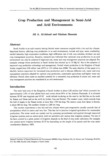Crop Production and Management in Semi-Arid and Arid Environments
JIRCAS international symposium series
| ISSN | 13406108 |
|---|---|
| 書誌レコードID(総合目録DB) | AA1100908X |

本文フルテキスト
intlsymp-10_105-116.pdf432.05 KB
Saudi Arabia is an arid country having limited water resources coupled with a hot and dry climate. Important factors, affecting crop production in an arid environment, include soil type, water availability, rainfall intensity, high evaporative conditions, high infiltration rate of soil, crop selection, fertilizer use and crop management practices. Recently, research has indicated that optimum crop production in an arid·environment can only be achieved if improved soil, water and crop management practices are adopted. For example: average wheat production in Saudi Arabia has reached up to 7-8 Mg ha-1 due to the adoption of improved crop production technology and management. Overall wheat production in the Kingdom of Saudi Arabia ranged from 0.28 million tons (1977) to 1.75 million tons (1998). The main objective of this paper is to identify factors important for increased crop production and to discuss different soil, water and crop management practices adopted for optimal crop production, sustainable agriculture and higher water use efficiency. Overall, there exists an excellent potential for a reasonable crop production if certain soil, water and crop management practices are considered in an arid environment.
| 作成者 | Ali A. Al-Jaloud Ghulam Hussain |
|---|---|
| 公開者 | Japan International Research Center for Agricultural Sciences |
| オンライン掲載日 | |
| 号 | 10 |
| 開始ページ | 105 |
| 終了ページ | 116 |
| 言語 | eng |
